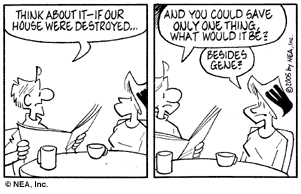Mocking the devil
Soon after my wife and I became Christians, the first holiday out the window was Halloween. It was obviously devilish, and we wanted our children to have nothing to do with it.
Back in the '80s and early '90s, Satanism scaremongers like the now-discredited Mike Warnke saw nothing but evil in the celebration of Halloween, and American Christians, steeped in the belief that the end times were upon us, were all too eager to believe the worst about any subject.
As my wife and I grew to understand more fully the sovereignty of God, our views on Halloween relaxed. But we were never completely comfortable with the idea.
Until last year. Funny how one well-written article can dismantle all manner of faulty prejudices.
You must read the whole article. For one thing, it's short. Well, kinda short. For another, it's rare to find someone with this opinion of what is so commonly believed to be a Satanic holiday co-opted by the church. The truth may very well be the opposite:
(M)any articles in books, magazines, and encyclopedias are written by secular humanists or even the pop-pagans of the so-called "New Age" movement. ... These people actively suppress the Christian associations of historic customs, and try to magnify the pagan associations. They do this to try and make paganism acceptable and to downplay Christianity. Thus, Halloween, Christmas, Easter, etc., are said to have pagan origins. Not true.
Oddly, some fundamentalists have been influenced by these slanted views of history. These fundamentalists do not accept the humanist and pagan rewriting of Western history, American history, and science, but sometimes they do accept the humanist and pagan rewriting of the origins of Halloween and Christmas, the Christmas tree, etc. We can hope that in time these brethren will reexamine these matters as well. We ought not to let the pagans do our thinking for us.
Read the entire article.
BONUS: Carve your own online pumpkin.






